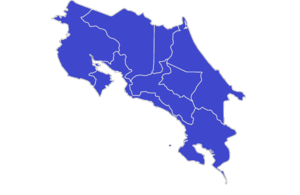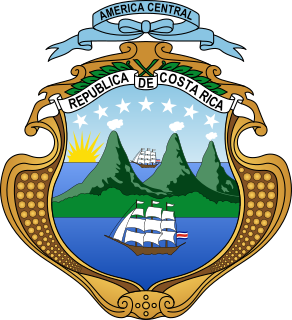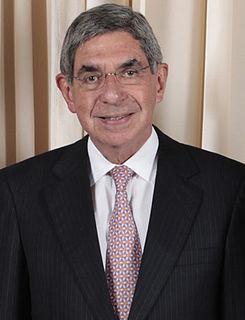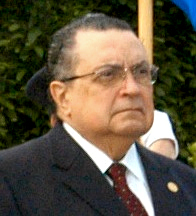| |||||||||||||||||||||||||||||||||
| Turnout | 81.8% | ||||||||||||||||||||||||||||||||
|---|---|---|---|---|---|---|---|---|---|---|---|---|---|---|---|---|---|---|---|---|---|---|---|---|---|---|---|---|---|---|---|---|---|
| |||||||||||||||||||||||||||||||||
 Provinces won by Calderón | |||||||||||||||||||||||||||||||||
| |||||||||||||||||||||||||||||||||
 |
|---|
| This article is part of a series on the politics and government of Costa Rica |
Legislature |
|
General elections were held in Costa Rica on 4 February 1990. [1] Rafael Ángel Calderón Fournier of the Social Christian Unity Party won the presidential election, whilst his party also won the parliamentary election. Voter turnout was 81.8%. [2]

Costa Rica, officially the Republic of Costa Rica, is a country in Central America, bordered by Nicaragua to the north, the Caribbean Sea to the northeast, Panama to the southeast, the Pacific Ocean to the southwest, and Ecuador to the south of Cocos Island. It has a population of around 5 million in a land area of 51,060 square kilometers. An estimated 333,980 people live in the capital and largest city, San José with around 2 million people in the surrounding metropolitan area.

Rafael Ángel Calderón Fournier served as President of Costa Rica from 1990 to 1994. He was the presidential candidate of the Social Christian Unity Party for the national elections held in February 2010, but resigned his candidacy on 5 October 2009, when he was sentenced to five years in prison for two counts of corruption.

The Social Christian Unity Party is a centre-right political party in Costa Rica.
Unlike previous elections, Calderon's nomination was not undisputed. Despite expressing that he would not run again for President after the results of the previous race, he was eventually convinced by his followers. Yet, young former minister and business man Miguel Ángel Rodríguez Echeverría from the liberal faction inside PUSC choose to face Calderón at the primaries. [3] [4] Former deputy José Hine from PUSC's left wing also run with testimonial results.
Liberalism is a political and moral philosophy based on liberty and equality. Liberals espouse a wide array of views depending on their understanding of these principles, but they generally support civil rights, democracy, secularism, gender equality, racial equality, internationalism, freedom of speech, freedom of the press, freedom of religion, and free markets.
Despite the fact that Rodríguez clearly had no chance against Calderón, his candidacy was considered a smart move, as he would start to be in the spotlight and helping his way in future nominations. [5] As expected, Calderón won the primary election with 75% of the votes. On the other sidewalk former vice president Carlos Manuel Castillo won over young minister Rolando Araya Monge (nephew of ex-president Luis Alberto Monge) in PLN's primaries after a very hostile and traumatic campaign, in which Castillo even accused Araya of links with Narcotraffic, something that weakened PLN. [6] Minor parties proliferated in this election, with up to 12 different parties taking part, of which only left-wing coalition United People having some relevance with sociologist Victor Daniel Camacho as nominee earning 3% of the votes.

Rolando Araya Monge is a Costa Rican socialist politician. He is a nephew of former president Luis Alberto Monge.

Luis Alberto Monge Álvarez was the President of Costa Rica from 1982 to 1986. He also served as Costa Rica's first Ambassador to Israel from 1963 until 1966.

The National Liberation Party, nicknamed the verdiblancos, is a political party in Costa Rica. The party is a member of the Socialist International.














